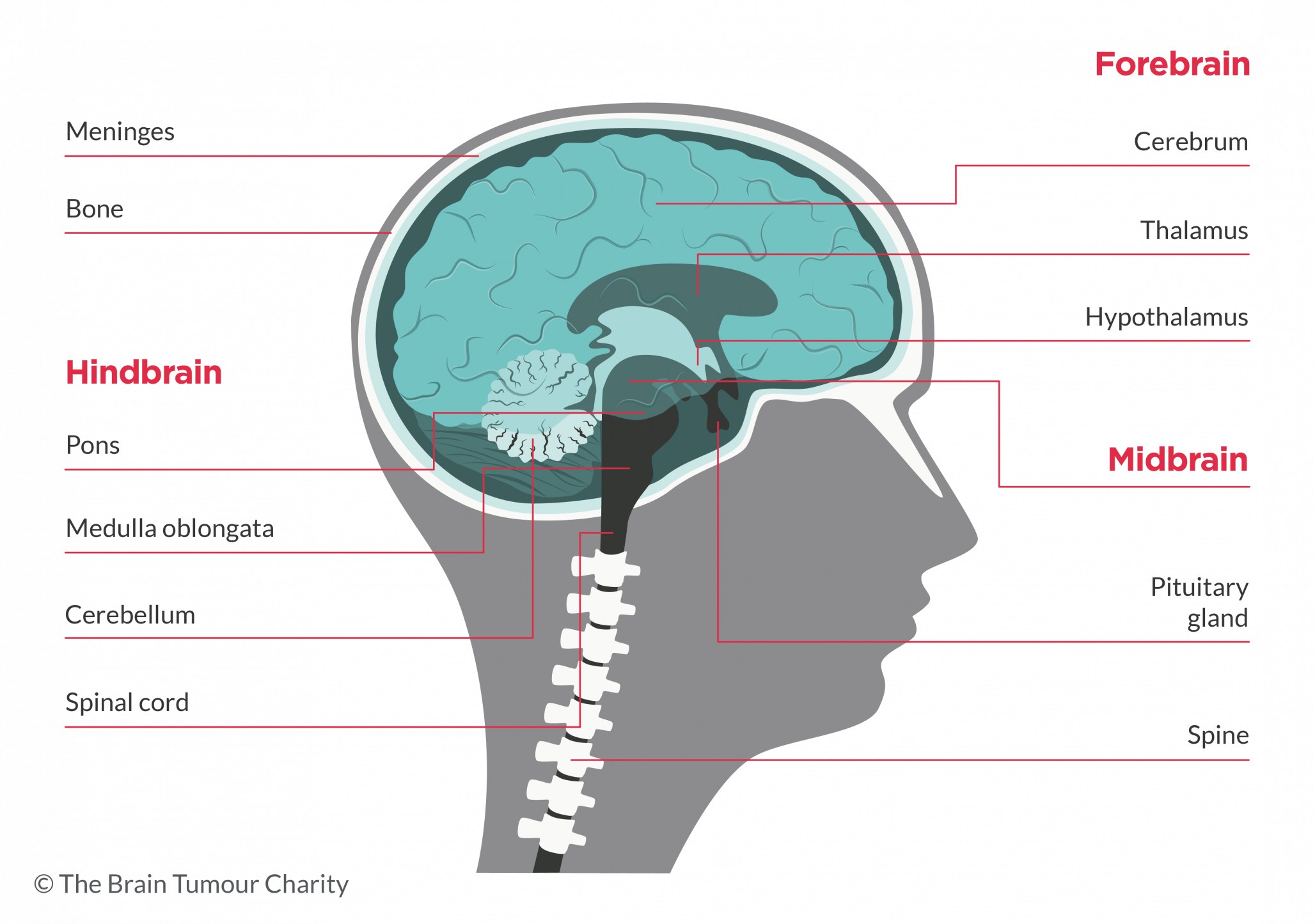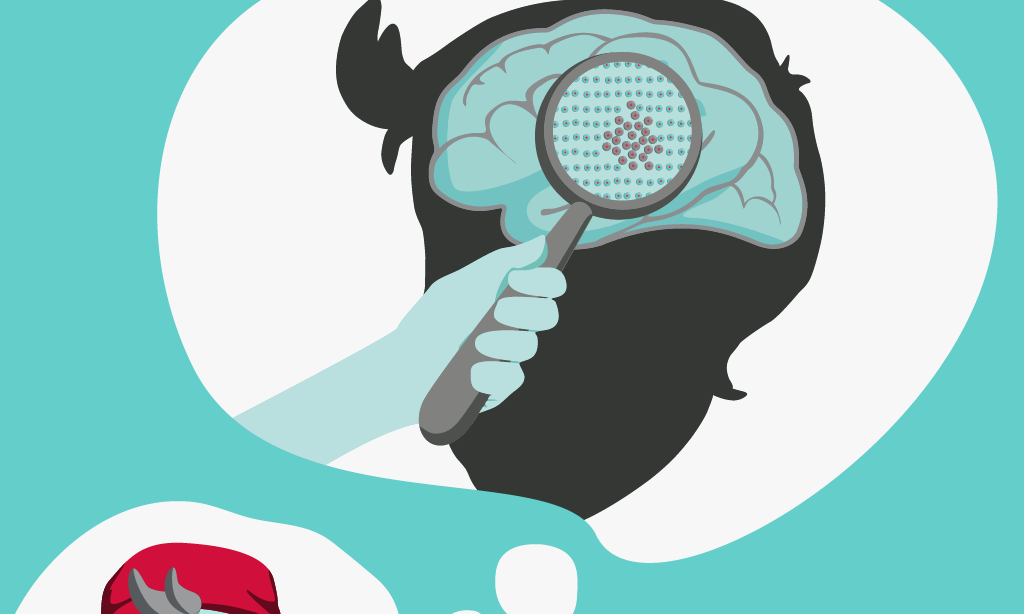Embryonal tumours
Embryonal tumours are brain tumours that develop from embryonic cells. These are cells left over from when we were growing in the womb as an embryo. There are multiple types of embryonal tumours, with the most common being medulloblastoma. These tumours were previously called Primitive Neuro-Ectodermal Tumours or PNETs.
Short summary
Embryonal brain tumours are tumours that mostly affect children. They form from embryonic cells, which are left over from when the child was in the womb.
There are different types of embryonal tumour. But, the most common is medulloblastoma. These make up about 73% of embryonal tumours.
Embryonal tumours are often high grade and are usually treated with either neurosurgery, radiotherapy, chemotherapy, or a combination of these.
On this page, we’ll discuss:
- What are embryonal tumours?
- Types of embryonal tumour
- How common are embryonal tumours?
- Are embryonal tumours cancerous?
- Embryonal tumour symptoms
- How are embryonal tumours diagnosed?
- Embryonal tumour treatments
- Embryonal tumour prognosis
- I think my child has a brain tumour, what should I do?
Get support
It’s normal to feel shocked if you or someone you know has been diagnosed with a brain tumour. Our Support Team can answer questions you have or provide a listening ear if you need one.
Get your free Information Pack
Our Brain Tumour Information Pack can help you better understand your diagnosis and feel confident talking to your medical team.
Talking to your doctor
Learn more about how to approach your GP.
What are embryonal tumours?
Embryonal tumours are brain tumours that develop from cells left over from when we are developing in the womb. These cells are called embryonic cells. They are usually harmless, but they can sometimes lead to a tumour starting.
Tumours that start from embryonal cells used to be called Primitive Neuro-Ectodermal Tumours or PNETs. But, now that medical professionals are able to study them in more detail, they have decided that embryonal tumours is a more fitting name.
There isn’t just one type of embryonal tumour. There are different types of tumour that form from embryonic cells. These all have their own specific names, but they are all classified as embryonal tumours.
Types of embryonal tumour
Embryonal tumours occur in the brain or the spine. They can be classified by where they form in the brain, meaning they can either be supratentorial tumours or infratentorial tumors.
This means they develop above or below the tentorium – a membrane which separates the cerebellum from the lobes of the brain.
Infratentorial tumors develop under the tentorium, usually in the cerebellum or brainstem. Supratentorial tumours develop above the tentorium, usually in the cerebrum (or forebrain).
The infratentorial embryonal tumours are far more common than the supratentorial embryonal tumours.
Some of the types of embryonal tumour are:
- Medulloblastoma – these usually develop in the cerebellum and are infratentorial
- Atypical teratoid/rhabdoid (AT/RT) tumours – these usually develop in the cerebellum and are infratentorial
- Pineoblastoma – these usually develop in the pineal region of the brain and are supratentorial
- Embryonal tumour with multilayered rosettes (ETMR) – these usually develop in the cerebrum and are supratentorial
- CNS neuroblastomas – these can develop in the cerebral nerve tissue at the front of the brain and are supratentorial
- CNS embryonal tumours NOS – these are embryonal tumours that are Not Otherwise Specified (NOS). This means that there is not enough information to be able to place the tumour in one of the specific groups of embryonal tumours.

How common are embryonal tumours?
Embryonal tumours are more common in children and young adults. About 20-25% of childhood brain tumours are embryonal tumours.
Embryonal tumours occur most frequently in younger children and incidence decreases with age with more than half being diagnosed in children less than 10 years old.
Nearly three-quarters (73%) of these tumours are medulloblastomas.
Are embryonal tumours cancerous?
Not all embryonal tumours are cancerous. It depends on the type of tumour and how much it has developed.
Most embryonal tumours tend to be diagnosed as Grade 4, which is considered to be cancerous. But, these tumours are sometimes diagnosed as low grade, which are considered benign.
Embryonal tumour symptoms
Embryonal tumours can develop in different areas of the brain. So, it is difficult to say which symptoms your child might experience if they are diagnosed with one.
This is because different parts of the brain are responsible for different things, and symptoms may depend on the part of the brain that is affected as well as the size of the tumour.
Also, everyone is different. So, your child’s body may react differently from another child who has the same type of tumour.
That being said, here are some common brain tumour symptoms in children:
- Headaches
- Nausea or vomiting
- Tiredness
- Vision problems like blurred or double vision
- Seizures
- Dizziness or trouble walking
- Weakness or partial paralysis on one side of the body
How are embryonal tumours diagnosed?
There are several tests used to diagnose embryonal tumour symptoms. These are:
Neurological exam
This is a test where a specialist will ask questions, run a physical examination, and run a nervous system examination which tests things like vision, reflexes, and alertness.
MRI or CT scan
During these scans, specialists will take a detailed image of the brain.
Your child may be given an MRI or a CT scan, which builds a 3D image of the brain.
The difference between these types of scan is that CT scanners use radiation x-rays to create the image while MRI scanners use magnetic fields, which have no radiation. MRI scans tend to create more detailed images as well.
Your child will be given the scan that is best suited to your needs.
Biopsy
A biopsy is a procedure where a surgeon will take a small sample of the brain tumour to test in a laboratory.
This will help to diagnose the type of brain tumour if scans were not used or were not clear. The sample will also help your child’s healthcare team decide on the best course of treatment.
Embryonal tumour treatments
Treatment for an embryonal tumour will depend entirely on the type of tumour, its size and location, and your child’s medical history.
Here are some possible treatment options:
Surgery
Your child may be given surgery to remove as much of the tumour as possible without harming the healthy brain around it.
Surgery might also be needed if the tumour is causing a build-up of fluid in the brain, which is called hydrocephalus. Sometimes this might be the only need for the procedure, or it could be done at the same time as removal of the tumour.
In some cases surgery might be the only treatment type, but sometimes it can be used as a first treatment and followed up with a plan of radiotherapy or chemotherapy.
Radiotherapy
Radiotherapy is a type of treatment that uses beams of charged particles to target and destroy brain tumour cells. This treatment aims to do as little damage as possible to the healthy cells around the tumour.
Radiotherapy alone might be used to treat an embryonal tumour, or it might be used alongside other treatments. This depends on the specially-designed treatment plan created by your child’s medical team.
Chemotherapy
Chemotherapy is a treatment that uses anti-cancer drugs to target tumour cells by interrupting, or stopping, their growth.
This treatment can be given by injection, known as an IV drip. Or it can be given orally, either in liquid or tablet form.
Chemotherapy might be used as the main treatment approach or could be given after surgery to target any remaining tumour cells.
Embryonal tumour prognosis
We understand that prognosis can be difficult to read about. So, if you are not ready for this right now, please skip over the section below.
You can bookmark this page and return to it in the future if you would like to learn more about embryonal tumour prognosis.
-
It is difficult to give an estimated prognosis for embryonal brain tumours. This is because there are so many different factors that can affect this.
Your medical team will be able to give your child a prognosis that is personalised to them. This will take into account factors like:
- The type of tumour
- Where the tumour is positioned in the brain
- The size of the tumour
- The grade of the tumour
- Whether it has been treated before or is newly diagnosed
To learn more about the prognosis for medulloblastoma brain tumours, click the button below.
I think my child has a brain tumour, what should I do?
Brain tumours are rare. But, if you’re worried and a symptom persists or if your child has more than one symptom of a brain tumour then:
Talk to your doctor
GP appointments are usually quite short, so make sure you find out how to best prepare for your child’s appointment.
Get an eye test
If your child’s symptoms are limited to changes in vision and/or headaches, get their eyes tested by an optician before seeing your GP.
Go to A&E
If the symptoms are sudden or severe, you should go to your emergency department or call 999.

Join our community on Facebook
Our closed Facebook group for parents is a great place to connect with other parents affected by a brain tumour and share your experiences.
Support and Information Services
Research & Clinical Trials Information
You can also join our active online community.
In this section

Get support
If you need someone to talk to or advice on where to get help, our Support and Information team is available by phone, email or live-chat.
Get your free Brainy Bag
Our Brainy Bag is a free gift for children and young people who have been diagnosed with a brain tumour, made up of a range of handpicked toys and activities!
Recommended reading
Share your experiences and help create change
By taking part in our Improving Brain Tumour Care surveys and sharing your experiences, you can help us improve treatment and care for everyone affected by a brain tumour.
